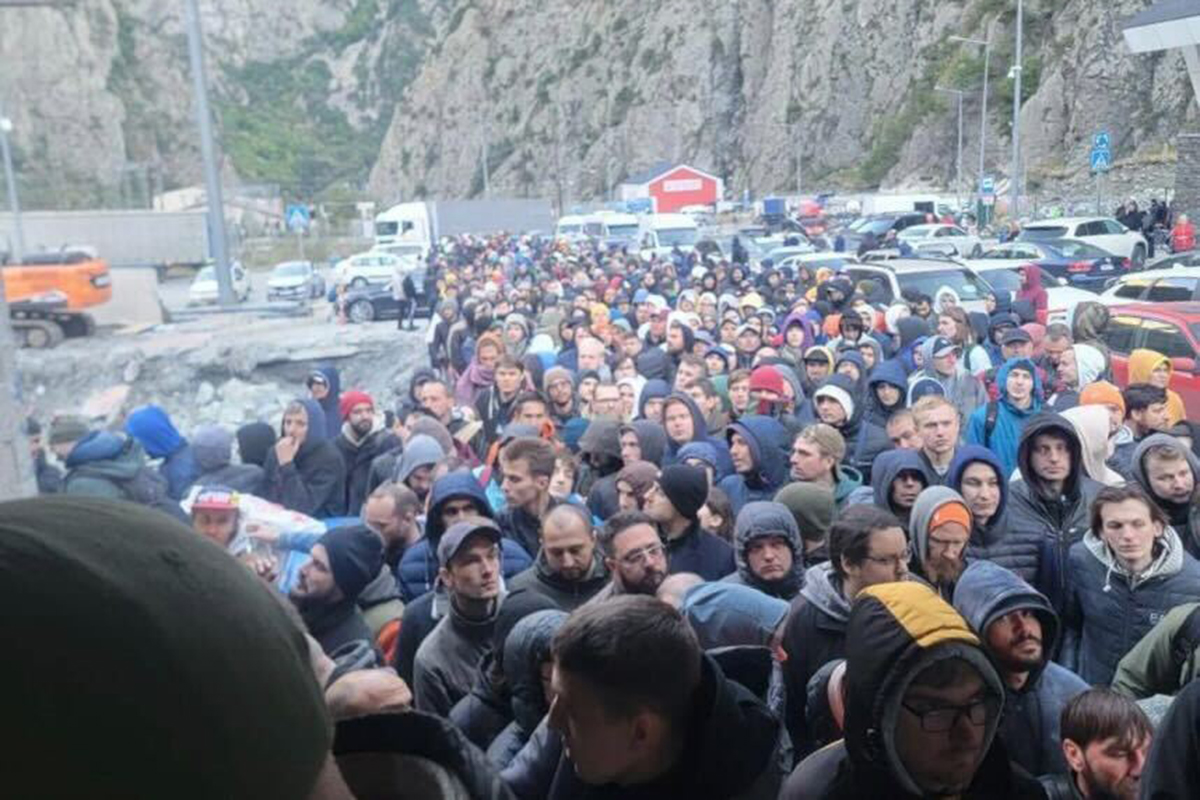
As Western nations close their borders to those escaping mobilisation, Georgia and Armenia are left to deal with the new arrivals.
‘I had to go because it feels like practically everyone is going to be drafted soon’, says 37-year-old Kolya, who quit his job at a high-end coffee roastery in Saint Petersburg and cycled across the border into Georgia after two days of travelling. ‘I’m just staying with friends at the moment in Tbilisi, but I’m hoping I can find work as a barista soon.’
As many as 700,000 people have left Russia since the announcement of ‘partial mobilisation’ on 21 September, Forbes reports, citing a source in the Kremlin. Long queues have formed at land borders in the Caucasus and Central Asia, while prices for one-way plane tickets have skyrocketed by thousands of dollars. Former Soviet Republics are bearing the brunt of the sudden influx, given EU states have closed their airspace to flights from Russia and imposed a series of entry restrictions on its citizens since the start of the war.
[Read on OC Media: ‘A humiliating experience’: 4 days in limbo on the Georgian–Russian border]
According to the Georgian Interior Ministry, more than 78,000 Russians like Kolya entered the country in the first week following mobilisation alone. Once there, they can effectively stay indefinitely, and automatically have the right to work. Neighbouring Armenia, where Russians can travel even without an international passport, is yet to publish any official statistics, but dozens of packed flights are landing in Yerevan every day. Azerbaijan, meanwhile, appears to have far fewer new arrivals, as its land borders have remained closed since the start of the COVID-19 pandemic.
An economic fallout
Unlike the wave of Russian émigrés who moved abroad in March to avoid the economic and political consequences of the war, those now racing to escape conscription are often in a far more vulnerable position and less able to work remotely or find new jobs.
Nurbek Osmanov, 29, moved to Moscow nearly a decade ago from Kyrgyzstan in hope of building a better life, working as a taxi driver for ride-hailing platform Yandex and eventually becoming a Russian dual national. He has also now crossed into Georgia after sleeping in his car for three nights while queueing at the Upper Lars checkpoint. ‘I just want to go home to Kyrgyzstan,’ he says, ‘but the $150 I have isn’t enough to get there.’
With a growing number of desperate people burning through their savings to avoid having to return to Russia, landlords in Georgia and Armenia appear to be putting up prices, and hotel rates have risen with demand. Last week, Booking.com warned it had no free options in Tbilisi, while a three-night stay in the only chain hotel with available rooms in Yerevan cost close to $2,000.
[Read on OC Media: Russian émigrés face chilly reception in Georgia]
Without regular work and often unable to move money out of Russia due to sanctions, new arrivals are finding themselves in an increasingly precarious situation and many are forced to seek help from organisations that have set up shelters. One young Russian woman and her flatmates have even opened their home in Yerevan to those arriving in the country without a plan and desperate for a safe bed for the night.

The economic fallout is beginning to affect locals and long-time residents in the two South Caucasus countries. ‘When the first Russians came at the start of the war, my landlord doubled my rent from $400 a month to $800, and evicted me when I wouldn’t pay,’ says Elodie Gavrilof-Dernigossian, a teacher living in Yerevan. ‘Now, with the latest wave, apartments are going for twice as much as that. And while we’re paying Manhattan prices, we’re not getting Manhattan services — the water in my new place is switched off at the moment.’
At the same time, political tensions with Russia are rising across the region as well. After Azerbaijani forces began shelling Armenian towns and villages in September, with soldiers moving in to capture territory inside the country’s borders, Yerevan lodged a formal request for support as a member of the Moscow-led CSTO military bloc. However, evidently unwilling to intervene and distracted by its war in Ukraine, the Kremlin has so far refused to get involved directly, and major protests have been held on the streets of the capital as demonstrators waved Ukrainian flags and calling for withdrawal from the alliance.
‘There has been crumbling confidence in Russia’s intentions vis-à-vis Armenia’, says Laurence Broers, an Associate Fellow at international affairs think tank Chatham House. ‘That’s a difficult context in which to accept large influxes of Russians.’ In Georgia, meanwhile, he argues ‘having fought a war with Russia in 2008 and seeing Moscow as an occupying power, a substantial number of arrivals also presents a significant challenge.’
In August, Georgia detained a 20-year-old alleged informant for Russia’s FSB security agency who had reportedly been sent to the country to spy on dissidents based in Tbilisi, sparking fears about the intentions of new arrivals.
A crisis brewing?
Writing for OC Media just a week after Russian President Vladimir Putin issued his ‘partial mobilisation’ order in September, Kelly Degnan, the US Ambassador to Georgia, urged the country to welcome those escaping conscription. ‘We hope Georgia will continue to serve as a sanctuary for those fleeing the war in Ukraine, as well as oppression in Russia and Belarus’, she added.
At present though, Western nations have said little about the negative consequences of the rising number of Russians arriving in the two countries, despite growing concerns. ‘We believe it is up to each country to control immigration onto its territory and to assess potential security risks associated with it,’ a spokesman for the EU External Action Service told OC Media.
However, according to Markéta Gregorová, a Czech MEP and member of the European Parliament’s Delegation for Relations with the South Caucasus, the influx of Russians ‘will have severe security and socio-economic implications and possibly cause a more significant crisis in certain regions.’

Speaking to OC Media, Gregorová urged both the EU and Western nations that have closed their borders to Russians to ‘increase their support to maintain stability in the South Caucasus’. That said, any solutions will have to be targeted and first requested by those governments, she added.
For the time being, neither Georgia nor Armenia has publicly called for humanitarian aid or economic support to help deal with the situation. ‘Ethnic Russians have been coming to Georgia for years — why should it become a problem now?’ Georgian Interior Minister Vakhtang Gomelauri asked journalists on 27 September.
Responding to a query from OC Media, Lilit Hakobyan, a spokesperson for the Armenian Ministry of Economy echoed those comments. ‘We see a certain interest and growth on the part of the Russians because they are well acquainted with our country,’ she says. ‘When it comes to support from Western nations, first of all, we would like support in the legal field regarding Azerbaijani aggression. Only in peace can we talk about the economy and other important aspects of life.’
With Putin doubling down on the invasion, and his troops losing swathes of ground to Ukrainian counteroffensives, it is clear the resolve of many young Russians to avoid being sent off to fight is only growing. But, without a plan to deal with hundreds of thousands of new arrivals, Georgia and Armenia could soon find they have a crisis on their hands as more and more young men turn up hoping to sit out the war.








